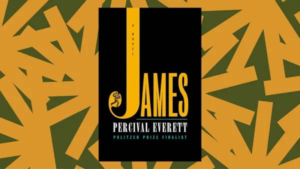
By Percival Everett
320 pages
Published March 19, 2024
James – a reimagining of Mark Twain’s Adventures of Huckleberry Finn from the perspective of Jim, the runaway slave – was The Mules book selection for June. And when I started reading it, I thought, “Oh boy! Here we go with another woke narrative.” Which is to say that, though the reviews were overwhelmingly laudatory (“Gripping!”… “Thrilling!”… “Genius!”… “Masterpiece!”… etc., etc.), I was prejudiced against it from the get-go.
There were sections of the novel that didn’t pass muster for me in terms of what T.S. Eliot called the “objective correlative” – a concept in literary criticism suggesting that the emotions of a character should be expressed through external objects, a situation, or a chain of events that can evoke those emotions in the reader. But as I moved through it, I was caught up in the plot itself, which is always the most important (and for the author the most difficult) part. Then I began to admire Percival Everett for his undeniably high marketing intelligence – i.e., creating a novel that would have Huckleberry Finn, one of the most loved and accomplished novels in American fiction, serve as a springboard for the success of this book – and his equally impressive literary skills.
James is a novel that aimed to be not just a bestseller but also a literary award winner, both of which lofty goals Everett achieved.
But here’s the thing… it had a remarkably divisive effect on The Mules, with half the group strongly liking it and the other half disgusted by it. We’ve had plenty of disagreements over books before, but I can’t remember the opinions being so neatly divided and so strongly felt on each side.
I liked more about James than I disliked – and since I consider my opinion the correct one, I can recommend it to you without qualification. But I found it interesting that 100% of those that hated the book had read it, while 100% of those that liked it had listened to it.
I thought about that later that night, and sent this email to the rest of the group:
I have, as some of you know, produced three movies. The first was terrible. The second was bad. And the third was “not bad.” (But not good.)
Despite the low quality of two of the three scripts (which I wrote), I did discover something about acting that surprised me. I noticed that most of the actors that tried out for a part somehow managed to emphasize the badness of my lines, but there were a few that somehow made them work.
I had been a devotee of the auteur view of cinema: that the director is the one and only person that can make a movie succeed or fail. But this experience taught me what a difference good acting can make.
So, it might be that the actor(s) on the audio version of James were good enough to make the lines that didn’t work for those of us who read the book believable to those of us that listened to it.
That’s my two cents…
